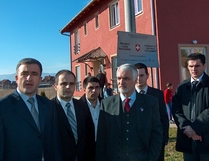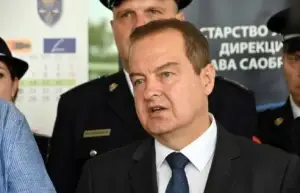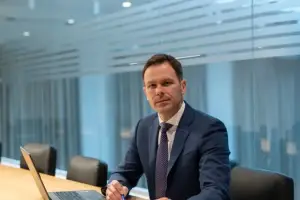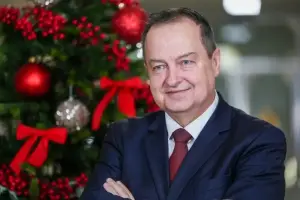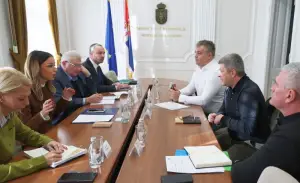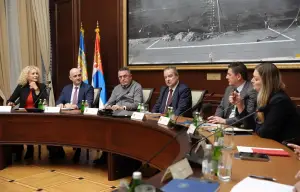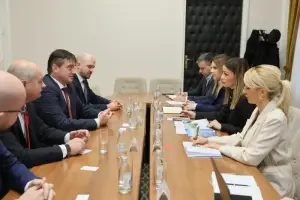Q:
A:
Continuing cooperation with local authorities in the EU integration process
Paracin,
29 November 2005
Serbian Deputy Prime Minister and head of the Serbian negotiating team in talks with the EU Miroljub Labus said today in Paracin that the Serbian government is ready to cooperate with local municipal authorities in the process of EU integration.
During his stay in Paracin, as part of the "Europe Knocks on Your Door" campaign, Labus said that this campaign is an opportunity to exchange opinions and see what can be done within the campaign along the lines of joint efforts. He recalled that this is the 14th visit to local self-governments since the onset of the campaign.
Speaking with local self-government representatives, Labus said that when the campaign first kicked off, it was unclear whether Serbia would get a positive assessment of the Feasibility Study and begin the talks on EU integration, whereas that situation is now positively known.
The Serbian government delegation and 15 senior officials of European embassies also visited the Dankovo refugee residential settlement, whose construction was enabled by the Danish Council and the Swiss Refugee Council.
In Dankovo, there are 20 families living in ten houses and one block of flats, while the construction of another one is drawing to an end. The local self-government had provided ten million dinars for the construction of these houses.
Labus said that the refugees from Croatia and Bosnia and Herzegovina who came to Serbia are still facing the problem of social integration, and recalled that the Serbian government’s role had been to seek the support of foreign partners to build homes for these people.
According to Labus, Paracin is a good example of how the local self-government should do its part of the job, because in some municipalities there have been examples of authorities using the given financial assistance inappropriately.
During the afternoon press conference, Labus recalled that at the campaign’s opening ceremony in March, only one foreign diplomat had accompanied the Serbian government delegation, and today there are 15 of them, which demonstrates that confidence in Serbia’s EU integration process has grown among the EU representatives.
Speaking with local self-government representatives, Labus said that when the campaign first kicked off, it was unclear whether Serbia would get a positive assessment of the Feasibility Study and begin the talks on EU integration, whereas that situation is now positively known.
The Serbian government delegation and 15 senior officials of European embassies also visited the Dankovo refugee residential settlement, whose construction was enabled by the Danish Council and the Swiss Refugee Council.
In Dankovo, there are 20 families living in ten houses and one block of flats, while the construction of another one is drawing to an end. The local self-government had provided ten million dinars for the construction of these houses.
Labus said that the refugees from Croatia and Bosnia and Herzegovina who came to Serbia are still facing the problem of social integration, and recalled that the Serbian government’s role had been to seek the support of foreign partners to build homes for these people.
According to Labus, Paracin is a good example of how the local self-government should do its part of the job, because in some municipalities there have been examples of authorities using the given financial assistance inappropriately.
During the afternoon press conference, Labus recalled that at the campaign’s opening ceremony in March, only one foreign diplomat had accompanied the Serbian government delegation, and today there are 15 of them, which demonstrates that confidence in Serbia’s EU integration process has grown among the EU representatives.
He said that yesterday’s adoption of the 2006 budget is very important both for Serbia and the government because, on one hand, this means complete certainty regarding the public financing and the economic policy that will be carried out as of 2006, and on the other it is a confirmation of Serbia’s political stability.
There are several important events awaiting the Serbian government. Most importantly, there is the second round of talks on the Stabilisation and Association Agreement with the EU (SAA) scheduled for December 20, for which Serbia is conducting arduous preparations, said Labus and added that he is convinced that next year Serbia will have signed the SAA with the EU.
Talks with representatives of the International Monetary Fund (IMF) are to be continued any day now, he said, and since the budget has been adopted, along with all the accompanying laws, the talks will be successfully completed in the next several days.
Labus also said that the adoption of the budget is an extremely positive signal that Serbia has sent to the international business world, and pointed out that after that, Serbia will not only have $700 million of its debt written off and the country’s foreign debt reduced, but also its credit rating will improve from the current BB- to BB.
There are several important events awaiting the Serbian government. Most importantly, there is the second round of talks on the Stabilisation and Association Agreement with the EU (SAA) scheduled for December 20, for which Serbia is conducting arduous preparations, said Labus and added that he is convinced that next year Serbia will have signed the SAA with the EU.
Talks with representatives of the International Monetary Fund (IMF) are to be continued any day now, he said, and since the budget has been adopted, along with all the accompanying laws, the talks will be successfully completed in the next several days.
Labus also said that the adoption of the budget is an extremely positive signal that Serbia has sent to the international business world, and pointed out that after that, Serbia will not only have $700 million of its debt written off and the country’s foreign debt reduced, but also its credit rating will improve from the current BB- to BB.

